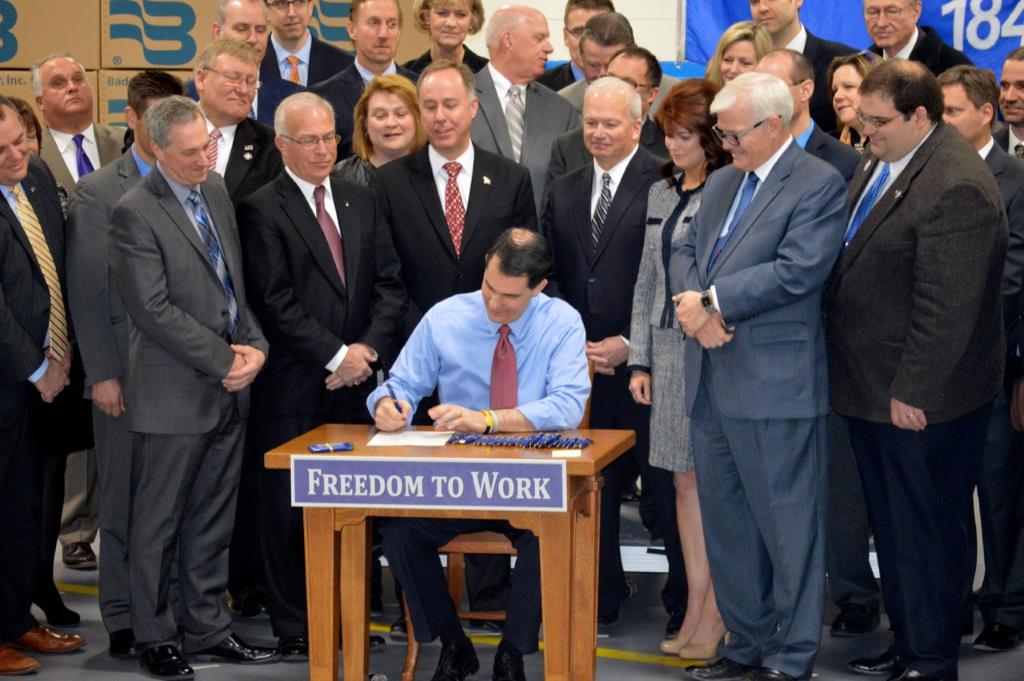How Republicans Worked to End Public Records
Planning began last September and would have ended open records for all local governments as well.
Republican Attorney General Brad Schimel noted the danger of tinkering with transparency at the summit he convened July 29 on open government. “Messing with open government laws is like touching the third rail,” Schimel said. “I think that lesson has been learned recently.”
The folks now running Madison got their hands burned while taking an ax to the trunk of our open records law, because the good people of Wisconsin—Republicans, Democrats and neither—rose up. The proposed changes were quickly pulled over the Independence Day weekend, and members of the public demanded to know who was responsible.
We’ve since learned more, thanks to our open records law. On the same day Schimel held his open government summit, the Milwaukee Journal Sentinel reported on a new batch of emails.
They show that it was Gov. Scott Walker and staff who added language exempting “deliberative process” documents from disclosure. This would have let elected representatives—and bureaucrats—bury records revealing lobbying, opinions, analyses, recommendations and negotiations that precede a decision.
They also show that Assembly Speaker Robin Vos (R-Rochester) and staff sought language to grant lawmakers broad new privileges to hide legislative documents, even when sued, and to ban their staffs from discussing issues even after leaving their jobs. No other state provides such an expansive legal privilege.
These restrictions would have applied not only to the governor and Legislature, but also to town, village, city and county boards and state and local agencies — to anyone in government worried that something in the records could bring a bit of embarrassment, an objection, a call for improvement.
No one had a whiff of what Walker, Vos and other party leaders were planning to do to the open records law until they stuck it into the state budget, at the last minute, just before a holiday weekend. We now know they had been working in secret on the changes for weeks, if not months.
The released records show that a Legislative Reference Bureau lawyer was researching legislative privilege language last September. Vos had the drafts written on special legislative privilege sometime before June 15. By then, Walker’s language to hide all “deliberative” records had been added.
Senate Majority Leader Scott Fitzgerald (R-Juneau) and Joint Finance Committee Co-Chairs Rep. John Nygren (R-Marinette) and Sen. Alberta Darling (R-River Hills) helped advance the changes. Ten additional Republican lawmakers voted them into the final draft of the budget bill that was meant to be quickly approved by the Senate and Assembly, then sent for the governor’s signature.
He is still refusing to release some records regarding his unpopular proposed changes to the mission statement of the University of Wisconsin, which he blamed on a drafting error. He is using the same language he tried and failed to insert into state law, saying he doesn’t have to release records made during deliberation of the proposed changes.
Two Republican lawyers agreed at Schimel’s summit that our open records law doesn’t exempt those records from disclosure: Raymond Taffora, former chief counsel to Gov. Tommy Thompson and a top deputy to Republican Attorney General J.B. Van Hollen; and Rick Esenberg, president of the conservative Wisconsin Institute for Law & Liberty.
The move appears no more than an attempt to avoid “political embarrassment,” Esenberg said.
This is not a partisan issue. The people of Wisconsin want open, honest government.
It is not too much to ask.
George Stanley (gstanley@journalsentinel.com) is the editor of the Milwaukee Journal Sentinel. Your Right to Know is a monthly column distributed by the Wisconsin Freedom of Information Council (www.wisfoic.org), a nonprofit group dedicated to open government.
Your Right to Know
-
‘Open’ Records Often Missing Names
 Dec 2nd, 2025 by Bennet Goldstein
Dec 2nd, 2025 by Bennet Goldstein
-
Data Center Secrecy Is Unacceptable
 Nov 4th, 2025 by Tom Content
Nov 4th, 2025 by Tom Content
-
Costs Shouldn’t Be Used To Deter Records Requests
 Oct 6th, 2025 by Mark Treinen
Oct 6th, 2025 by Mark Treinen





















